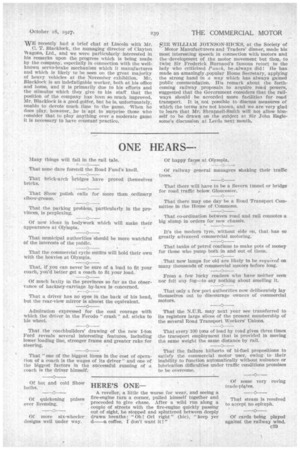ONE HEARS
Page 41

If you've noticed an error in this article please click here to report it so we can fix it.
Many things will fail in the rail tale.
That none dare foretell the Road Fund's knell.
That brick-arch 'bridges have proved themselves bricks.
That Show polish calls for more than ordinary elbow-grease.
That the parking problem, particularly in the provinces, is perplexing.
Of new ideas in bodywork which will make their appearance at Olympia, That municipal authorities should be more watchful of the interests of the public.
That the commercial cycle outfits will hold their own with the heavies at Olympia.
That, if you can never be sure of a load to fit your coach, you'd better get a coach to fit your load.: Of much laxity in the provinces so far as the observance of hackney-carriage by-laws isconcerned.
That a driver has no eyes in the back of his head, but the rear-view mirror is almost the equivalent.
Admiration expressed for the cool courage with which the driver in the Ferodo "crash" ad. sticks to his wheel.
That the coachbuilders' drawing of the new 1-ton Ford reveals several interesting features, including lower loading line, stronger frame and greater rake for steering.
That "one of the biggest items in the cost of operation of a coach is the wages of its driver" and one of the biggest factors in the successful running of a coach is the driver himself. Of happy faces at. Olympia.
Of railway general managers shaking their traffic trees.
That there will have to be a Severn tunnel or bridge for road traffic below OlOncester.
That there may one day' be a Road Transport Committee in the House of COmmons.
That co-ordination between road and rail connotes a big slump in orders for new chassis. s It's the modern tyre, without side on, that has so greatly advanced commercial motoring.
That tanks of petrol continue to make pots of money for those who pump both in and out of them.
That new lamps for old are likely to be required on many thousands of commercial motors before long.
From a few lucky readers who have neither seen nor felt any fog—to say nothing about smelling it.
That only a few port authorities now deliberately lay themselves out to discourage owners of commercial motors.
That the N.U.R. may next year see transferred to its registers large slices of the present membership of the several Road Transport Workers' Unions.
That every 100 tons of load by road gives three times the transport employment that is provided in moving the same weight the same distance by rail.
That the failure hitherto of hi-fuel propositions to satisfy the commercial motor user, owing to their inability to function automatically without nuisance or lubrication difficulties under traffic conditions promises to be overcome.












































































































